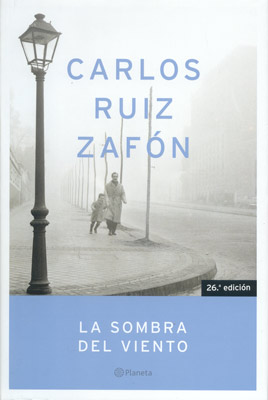 It begins and ends with a trip to a place called The Graveyard of Forgotten Books and personally I couldn't think of a more suitable home for Carlos Ruiz Zafón's mega-bestseller.
It begins and ends with a trip to a place called The Graveyard of Forgotten Books and personally I couldn't think of a more suitable home for Carlos Ruiz Zafón's mega-bestseller.Can so many Spanish readers be wrong? All I can say is that they do seem to revel in this kind of flat-pack 'classic' − with Arturo Pérez-Reverte being the biggest literary brand in this espacio...up to now.
I began by thinking I'd pass this novel on to V's bright and imaginative niece Raysa when I finished it, but have now concluded that it is neither childish enough for children or grown-up enough for adults.
The story is a sticky web of jumbled destinies within another of jumbled genres; in essence a blend of middle-European Gothic fantasy and sub-Dickensian detective piffle. And frankly, it's not really a story that needed to be told.
English-language reviewers try to draw what they see as the obvious stylistic comparisons. "García Márquez meets Umberto Eco meets Jorge Luis Borges," suggested Richard Eder in the New York Times. (In fact it's a lot closer to Isabel Allende − and yet there's more substance to even her brand of storytelling!)
Aside from the early reference to an impossibly large library, the comparison with Borges is especially unfortunate. When The Garden of Forking Paths was submitted to Argentina's National Awards for Literature the judges claimed to see in it "certain deviant tendencies of contemporary English literature" and declared that it hovered "between the tale of fantasy, a pretentious and recondite erudition and detective fiction." These were unfair criticisms of Borges' fictions, but would stick if thrown at The Shadow of the Wind. (Agh! Even the title is annoying!)
In spite of one significant 'fold' in the narrative, and other metaphorical markers of complexity, the plot advances rather like an adventure game where the protagonist moves forward in a strictly linear fashion, meeting strange new individuals and proceeding on the basis of the information they impart.
In the main the tale is narrated by one young man, but there are some odd switches, including a ludicrously extended suicide note that lasts for 81 pages. Most of the characters are really just ciphers for the novel's simplified moral universe. Indeed the city of Barcelona itself is the only personality in the story with any real depth.
Zafón has written extensively for the big screen and here spends far too long for my taste setting each scene visually. He is also one of those authors who seems more at pains to show us how much he cares about his characters − and they for each other − than actually giving his readers much reason to care about them.
I'm generally not that good at advance-guessing narrative surprises, but I could see all the key twists and outcomes here coming from a mile off. As a result it became steadily harder to turn the pages. All in all, Zafón appears to have set out to severely test the theory expressed by one of his characters, that there are "worse jails than words."

No comments:
Post a Comment